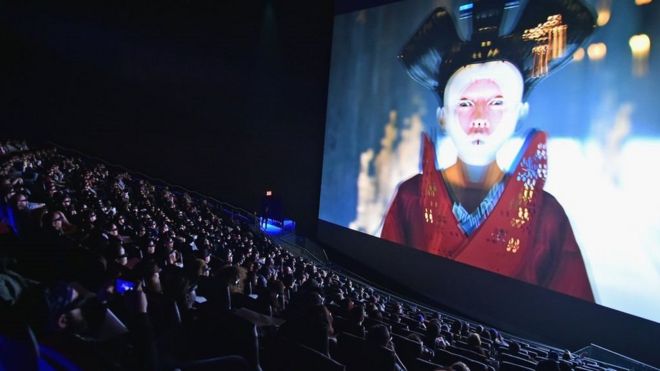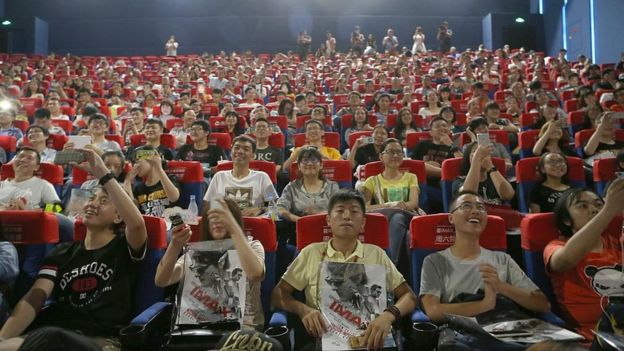Imax reveals European cinema expansion plan

Imax has struck a deal to more than double the number of its large screens in European cinemas run by the continent’s biggest operator.
AMC – which owns Odeon among other brands – plans to create 25 new Imax theatres over the next three years, about 10 of which will be in the UK.
Some will also be built in Germany, Italy, Spain and Scandinavia.
One expert said Imax had proved popular with those seeking a “premium experience”.
AMC and Imax expect to jointly spend about $25m (£20m) on the expansion plan and will subsequently share the revenues.
“One of the things that has really frustrated me over my 23 years [in charge] has been our inability to properly penetrate Europe,” Imax’s chief executive, Rich Gelfond, told the BBC.
“Europe has been challenging because of its infrastructure – the theatres are smaller, they are dated and don’t really fit the Imax specs, and the build-out [of new cinemas] has been slow.
“So, today is really a historic day for us.”
AMC is making the investment five months after taking over Odeon and a month after its acquisition of Nordic Cinemas. The company is itself controlled by China’s Dalian Wanda Group.
It is now engaged in a wider effort to upgrade its cinemas.
“One of the ways you get people not to watch a movie in their home or on their iPad is you offer them a 60ft [18.3m] screen,” said AMC’s chief executive Adam Aron.
“When consumers have so many choices… one of the smartest things we can do is put in more and more Imax or Imax-like experiences, because that is one of the long-term guarantors that people are going to still go out.”
The initiative will bring the total number of Imax cinemas run by all chains in Europe close to 250.
However, that figure will still lag behind the 800 in existence or in development in China and the 350 in the US.

“Imax has already proven its worth in many countries, and wouldn’t have built the brand it has, unless it had been able to attract the public,” commented Robert Mitchell from the trade magazine Variety.
“The question mark is whether it will succeed in countries like Germany, where cinema attendance has been dropping for the last couple of years and [where] Imax only has a few screens at present, so is less well known.”
Blockbuster films
Imax has developed a projection system that allows images to be shown on screens up to 100ft wide without becoming blurry.
It also offers filmmakers cameras that are able to capture higher resolution footage than normal.
Directors including Christopher Nolan and Michael Bay are fans, but the tech is normally restricted to blockbuster projects because of the additional costs it incurs.
In addition, Imax offers software to convert footage shot with normal cinema cameras, and has developed a proprietary sound system for its theatres.
It faces competition from other large-screen formats including Dolby Cinema, RealD Luxe and an in-house effort from AMC.
Marvel exclusive
To help distinguish itself, Imax recently announced plans to start screening original content unavailable elsewhere.
The first “exclusive” is a deal to show the first two episodes of a forthcoming Marvel TV show – The Inhumans – in September, several weeks before they come to television.
“Other companies like HBO went from Hollywood-content only to original programming,” Mr Gelfond explained.
“We’re following in those footsteps and thinking: why not bring a great original content experience at a slower time of the year?”
In addition, Imax recently launched a standalone virtual reality centre in Los Angeles and will shortly open different versions of the concept attached to cinemas in New York and London.
Members of the public pay to try out short experiences using StarVR headsets, which offer a wider field-of-view than rival tech.
The firm already offers content linked to the movies John Wick, Star Wars and The Walk, and has struck a deal with Warner Bros to create new experiences based on its DC superhero films.
Mr Gelfond said he hoped that this would attract Millennials – those born after mid-1990 – who had proved harder to attract to cinemas than older age groups.
But he acknowledged that it was early days for the tech.
“We are starting with about five to 10 VR centres that will all be open this year,” he said.
“We’ll look at the results. If they look good we’ll build it out at a much more significant way.
“And if they don’t we’ll have not lost much.”
[Source:- BBC]

